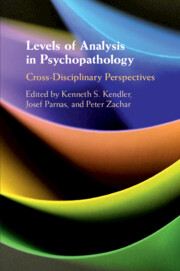Book contents
- Levels of Analysis in Psychopathology
- Advance Praise for Levels of Analysis in Psychopathology
- Levels of Analysis in Psychopathology
- Copyright page
- Contents
- Figures
- Tables
- Contributors
- Preface
- General Introduction
- Part I Neuroscience, Mechanisms, and RDoC
- Section 1
- 1 Introduction
- 2 Rethinking Psychiatric Disorders in Terms of Heterarchical Networks of Control Mechanisms
- 3 A Typology of Levels of Mechanisms Involved in the Etiology of Psychiatric Illness
- Section 2
- Section 3
- Part II Phenomenology, Biological Psychology, and the Mind–Body Problem
- Part III Taxonomy, Integration, and Multiple Levels of Explanation
- Index
- References
1 - Introduction
from Section 1
Published online by Cambridge University Press: 02 April 2020
- Levels of Analysis in Psychopathology
- Advance Praise for Levels of Analysis in Psychopathology
- Levels of Analysis in Psychopathology
- Copyright page
- Contents
- Figures
- Tables
- Contributors
- Preface
- General Introduction
- Part I Neuroscience, Mechanisms, and RDoC
- Section 1
- 1 Introduction
- 2 Rethinking Psychiatric Disorders in Terms of Heterarchical Networks of Control Mechanisms
- 3 A Typology of Levels of Mechanisms Involved in the Etiology of Psychiatric Illness
- Section 2
- Section 3
- Part II Phenomenology, Biological Psychology, and the Mind–Body Problem
- Part III Taxonomy, Integration, and Multiple Levels of Explanation
- Index
- References
Summary
Bill Bechtel is rare breed of philosopher whose writings on mechanistic models are afforded as much respect by scientists in biology and psychology as they are by philosophers. Earlier in his career Bechtel (1988a, 1988b) published two short books written largely for psychologists titled Philosophy of Mind: An Overview for Cognitive Science and Philosophy of Science: An Overview for Cognitive Science. These books demonstrated that he is adept at writing for a cross-disciplinary audience. His work on mechanisms, however, is of a decidedly technical nature, and nevertheless highly admired outside the philosophy of science.
- Type
- Chapter
- Information
- Levels of Analysis in PsychopathologyCross-Disciplinary Perspectives, pp. 21 - 23Publisher: Cambridge University PressPrint publication year: 2020
References
- 1
- Cited by



